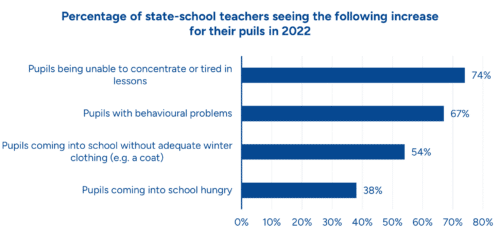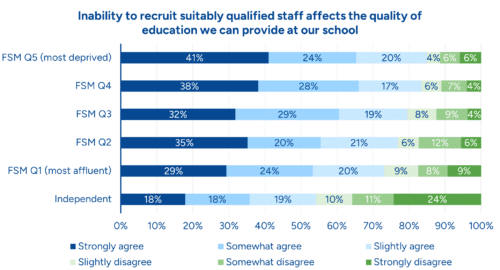Opinion piece from Sutton Trust
Schools and teachers in England are going through difficult
times. The pandemic and its aftermath as well as the cost of
living crisis have exacerbated already existing problems in
education leading to record levels of pupil
absence, increasing problems with
pupil behaviour and ever more challenging teacher
recruitment and retention.
As outlined in our recent General Election policy
briefing, they have also also led to a widening
disadvantage attainment gap. Although the factors combining to
create this almost perfect storm are multiple and complex, there
is nonetheless a common thread that can be traced running between
them that not only helps offer some understanding of the
interrelatedness of the problems but also offer a glimpse of at
least part of the solution. Linking these together is the
recurring theme of poverty and hunger.
At the start of the cost of living crisis Sutton Trust
polling found that 38% of state school teachers reported
seeing increasing numbers of children coming into school hungry
and 17% said they had seen an increase in families asking to be
referred to foodbanks. At the same time – and likely to be
related – 74% of teachers noted an increase in pupils unable to
concentrate or tired in class, 67% said they had seen more
students with behaviour issues. Indeed, the Trussell Trust, the
UK's largest food bank operator, supplied nearly 3 million
emergency food parcels in the 12 months to March 2023, the most
ever distributed by the network in a year and 37% more than in
the previous year. In the following six months to September 2023
they distributed a further 1.5 million, up 16% on the same period
in 2022.

Hunger in the classroom adversely affects pupil development
and academic achievement. Hungry children struggle to
concentrate, have low energy levels and are more likely to be
involved in disruptive
behaviour (which also affects others) and
display higher levels of
absenteeism. This all affects their academic progress and
ability to learn.
Teacher recruitment and retention is also related to poverty,
hunger and the attainment gap. Sutton Trust
research has found that schools serving disadvantaged
communities experience greater recruitment difficulties,
particularly in secondary schools. Teachers in the most
disadvantaged secondary schools in 2019 were twice as likely to
report that their department was not well-staffed with suitably
qualified teachers (30% compared to 14% in the schools with the
most affluent intakes) and 85% of teachers in disadvantaged
schools reported that recruitment was affecting the quality of
education their school was providing. This is partly because
disadvantaged schools are seen by many teachers as more difficult
to teach in. Behaviour can
also be an issue here so schools with more disadvantaged and
hungry pupils are likely to face more behavioural challenges.

Addressing hunger is not going to solve all of these problems,
but it is clear that it will go some way to addressing at least
some of them, freeing up schools to get on with teaching and
learning.
The next government needs to put in place interventions to end
hunger in schools. This is why the Sutton Trust has
been calling for the expansion of free school meals entitlement
to all pupils on universal credit and increasing breakfast club
provision beyond the patchy cover currently on offer. Breakfast
clubs have been
shown to tackle hunger in schools and help poorer
families with the costs of ensuring better nutrition for their
children. This in turn can help improve concentration and
preparedness for class, give children valuable social engagement
before class and help lead to better class behaviour and
attendance, ultimately leading to higher attainment. We should
therefore welcome Labour plans to expand
breakfast club provision to all primary
schools and Liberal Democrat
plans to extend free school meals to all children in
poverty. The current income cap on free school meal eligibility
excludes 1.7 million children in families eligible for universal
credit from this benefit while such families are six times more
likely to be classified as food insecure than ineligible
families.
Child poverty is not the only challenge facing our schools and
teachers, but what is clear is that until it is seriously
tackled, and ideally eradicated, we will undoubtedly continue to
see its impacts on education, particularly for the most
disadvantaged. In the meantime, practical interventions like
expanding FSM eligibility and breakfast clubs can at least go
some way to minimising these impacts.


